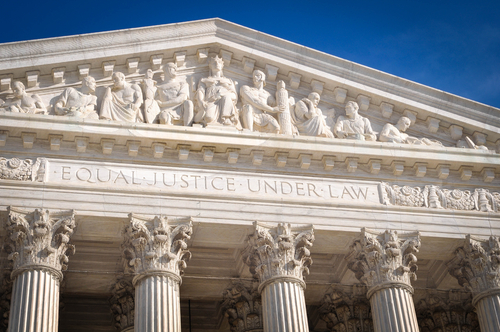Marriage Equality is Under Threat, But States Are Taking Action

Just over six years ago, the Supreme Court of the United States ruled that marriage equality was the law of the land. Long overdue, the landmark decision of Obergefell v. Hodges was a huge leap toward affirming the love and humanity of millions in the eyes of the law. Still, while same-sex couples have enjoyed the protections of more inclusive interpretations of the US Constitution, recent months have served to remind us that human rights can never be taken for granted. With the overturning of Roe v. Wade, activists fear marriage equality is under threat next.
America’s New Supreme Court
Obergefell v. Hodges was decided in the summer of 2015 by a 5-4 split along ideological lines. At that time, the momentum on the courts skewed towards justices with liberal interpretations of the constitution. In the years since, however, a few key events have shifted the balance of power in favor of conservatives.
First among them was the sudden death of Associate Justice Antonin Scalia in 2016. While Scalia was arguably the most conservative justice on the court at the time, his passing occurred at the tail end of the Obama administration. Then-President Barack Obama tapped Merrick Garland to fill this vacancy, only to be thwarted by Senate Majority Leader Mitch McConnell. McConnell refused to allow the Senate to vote on Garland’s confirmation, arguing that the victor of the upcoming 2016 election should nominate Scalia’s replacement. As such, Scalia’s seat wouldn’t be filled until April 2017 by Donald Trump appointee Neil Gorsuch, a staunch conservative judge.
Following Gorsuch’s appointment, the Supreme Court would see the appointment of two more conservative justices. Brett Kavanaugh was appointed in 2018 following Anthony Kennedy’s retirement, and Amy Coney Barrett filled the vacancy left by Ruth Bader Ginsburg following her death in 2020. The 6-3 conservative majority of today’s court has many concerned about the future of same-sex rights and other civil liberties.
What a Conservative Court Means for Marriage Equality
The current makeup of the Supreme Court includes four justices who voted against marriage equality in 2015 and two justices who appear to favor state legislation on human rights issues like same-sex marriage. The recent challenge to Roe v. Wade from the state of Mississippi raised concerns that marriage equality is under threat from the current Supreme Court. With the decision to overturn that case, the land’s highest court indicated that long-established legal precedence is in jeopardy. Recognizing the gravity of this moment, state legislatures may move to protect same-sex marriages should the courts fail to do so.
New Jersey and West Virginia Make a Stand
The state of New Jersey has opted to take action. With the support of Governor Phil Murphy, the New Jersey state legislature has enshrined marriage equality as a guaranteed right under state law. In the event that Obergefell v. Hodges comes under fire, the right for all couples to marry who they love will remain intact. The state of West Virginia is also moving to protect marriage equality under state law. Cody Thompson and Danielle Walker, the two openly LGBTQ lawmakers in West Virginia’s legislative body, plan to introduce a bill protecting marriage equality in early 2022.
The recent moves in New Jersey and West Virginia could be an indication of similar legislation in other states. Prior to the Supreme Court’s 2015 ruling, over half the country had already legalized same-sex marriage through their state courts. At this time, states with marriage equality guaranteed by state law are still in the minority. The overturning of Roe v. Wade could very well galvanize more states into action. These recent developments indicate that the struggle for human rights and equality continues beyond the bounds of the legal system.














